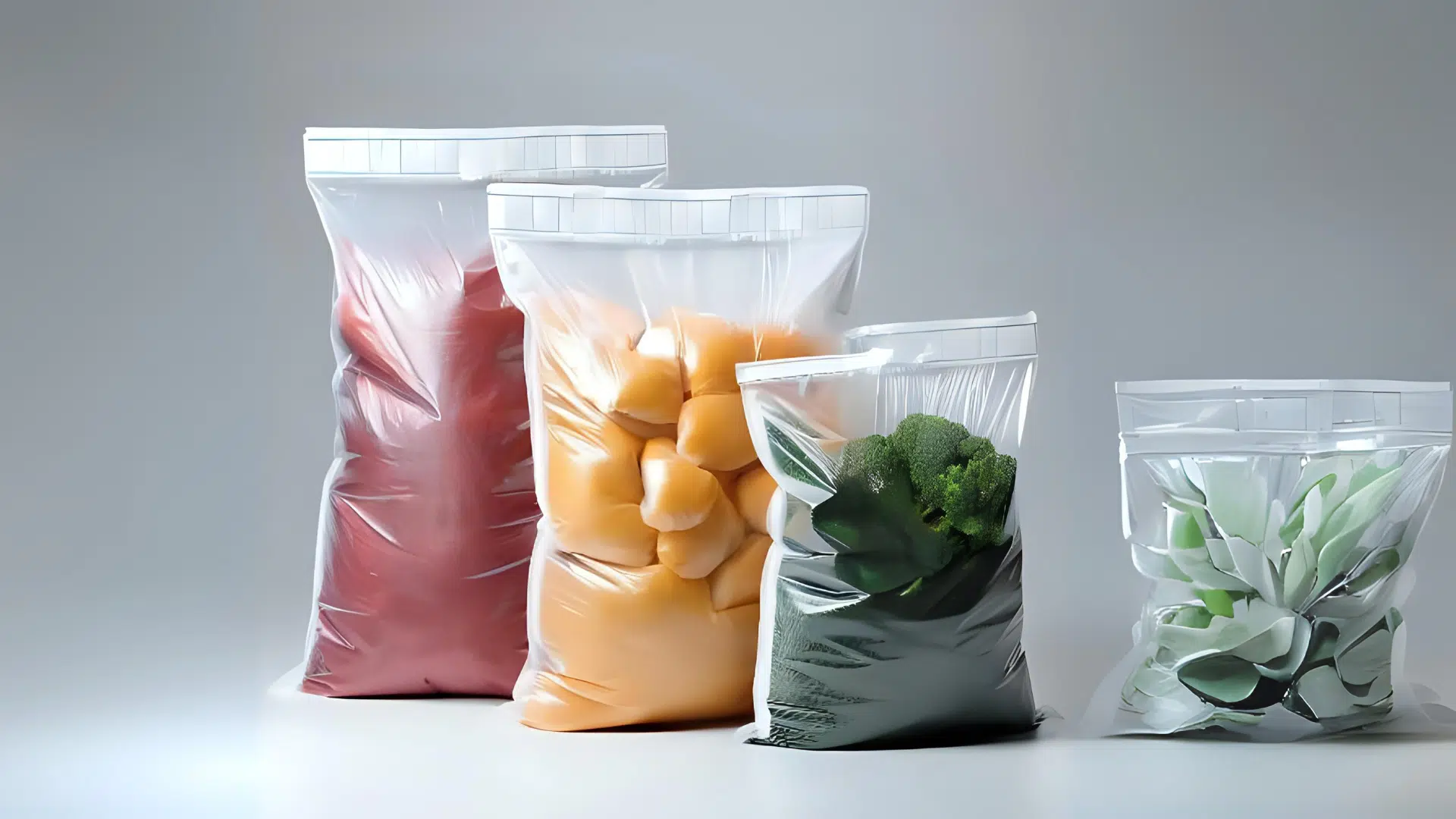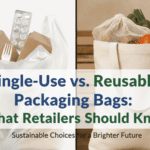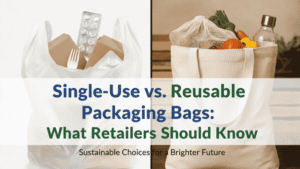
How Food-Safe Bulk Bags Protect Your Products and Brand Reputation

In the food industry, maintaining quality, hygiene, and safety is not just a regulatory requirement—it’s essential for brand trust and long-term success. Whether you’re handling grains, sugar, spices, dairy powders, or other edible products, using the right packaging can make or break your business. That’s where food-safe bulk bags come in.
These specialized bags are designed to safely store and transport food products while meeting stringent industry standards. In this blog, we’ll explain how bulk bags for food packaging help protect your products, meet compliance, and safeguard your brand reputation.
What Are Food-Safe Bulk Bags?
Food-safe bulk bags—also known as FIBCs (Flexible Intermediate Bulk Containers)—are large, durable, and hygienic containers designed specifically for storing and transporting food products. These bags are made from high-quality, non-toxic polypropylene fabric and are manufactured under clean, food-grade conditions.
Not all bulk bags are created equal. When dealing with consumables, you must ensure that the bags used are food-safe packaging bags, manufactured under strict controls to prevent contamination.
Why Are Food-Safe Bags for Bulk Storage Important?
Food products are sensitive to contamination, moisture, pests, and environmental exposure. When businesses use non-certified or low-quality packaging, they risk:
- Product spoilage or contamination
- Regulatory penalties or recalls
- Loss of consumer trust
- Damage to brand reputation
Food storage bulk bags offer protection by acting as a barrier between your product and the external environment. They help maintain freshness, prevent exposure to harmful substances, and ensure that your food items reach their destination in optimal condition.
Key Features of Food-Safe Bulk Bags
Food-safe bulk bags offer a range of features designed to keep your product clean and secure. Here are the top characteristics that set them apart:
- Food-Grade Certified Materials
The fabric used in food-safe packaging bags is FDA-approved and free from harmful chemicals, dyes, and lubricants. This ensures that there’s no leaching or contamination from the bag into the product.
- Cleanroom Manufacturing
These bags are produced in ISO-certified cleanrooms, which means the manufacturing process takes place in an environment with controlled temperature, humidity, and air quality. This greatly reduces the risk of dust, bacteria, or foreign particles contaminating the bags.
- Sanitary Liners
Some food-safe bulk bags come with inner liners made from polyethylene. These liners provide an extra layer of hygiene and moisture protection, which is especially important for powdered or granulated foods.
- Tamper-proof and Sealable Closures
Secure closures help keep the contents intact during storage and transit. Features like spouts, zippers, and heat-sealed liners prevent spills and protect against unauthorized access.
- Customizable Sizes and Designs
Whether you need vented bags for airflow or baffles to maintain shape during stacking, bulk bags for food packaging can be customized to suit your operational needs and product type.
How Food-Safe Bulk Bags Help Your Business
Investing in food-safe bags for bulk storage is more than a compliance move—it’s a business strategy that directly impacts your bottom line and brand perception. Here’s how:
- Compliance with Regulations
Regulatory bodies such as the FDA, HACCP, and EFSA (European Food Safety Authority) have strict requirements for food packaging. Using food-safe packaging bags helps you stay compliant and avoid costly recalls or legal issues.
- Reduced Product Loss
Contaminated or spoiled products lead to waste and financial losses. Food storage bulk bags minimize exposure to moisture, dust, and pests, reducing spoilage and extending shelf life.
- Improved Operational Efficiency
These bulk bags are designed for easy handling with forklifts, cranes, and other machinery. This reduces labor costs and speeds up your logistics operations—particularly important for high-volume food production.
- Enhanced Brand Trust
Consumers today are more informed and cautious about what they eat. When your business is associated with safety, cleanliness, and quality, your brand becomes more trustworthy and respected.
Common Industries That Rely on Food-Safe Bulk Bags
Food-safe bulk bags are used across a variety of industries, including:
- Grains and cereals: Wheat, rice, oats, corn
- Sugar and salt: Fine powders and granules
- Dairy and protein powders: Whey, casein, soy flour
- Spices and herbs: In bulk or ground form
- Confectionery and bakery ingredients: Cocoa, flour, starch
- Pet food and animal feed: Where safety and compliance still matter
If your business involves any of these products, you can’t afford to compromise on packaging quality.
How to Choose the Right Food-Safe Bulk Bags
Choosing the right packaging involves more than just price. Here are some tips for selecting the best bulk bags for food packaging:
- Verify Certifications
Always check for FDA, ISO, and HACCP certifications. Reputable manufacturers will provide documentation that proves the bags are safe for food use.
- Ask About Customization
Choose a supplier who can customize your bags—adding liners, spouts, anti-static features, or UV protection depending on your needs.
- Inspect Cleanroom Processes
Work with manufacturers who produce their food-safe bags for bulk storage in clean, controlled environments.
- Check for Traceability
In the event of a quality issue, traceability is key. Ensure your supplier uses batch tracking systems to identify and recall any compromised products quickly.
Real-World Brand Risks from Unsafe Packaging
There have been many public cases where poor packaging led to massive product recalls, lawsuits, and consumer backlash. These incidents not only cost millions in damages but often result in permanent brand damage.
For example, a spice company facing contamination due to improper bulk packaging had to recall tons of products. The fallout included customer complaints, loss of contracts, and negative media coverage. A simple investment in food-safe bulk bags could have prevented this.
Conclusion: Packaging Is a Reflection of Your Brand
When customers open a bag of your food product, they’re trusting you with their health. That trust is built—or broken—based on the quality of what’s inside and how it’s packaged.
By using high-quality food-safe bulk bags, you’re not only protecting your products from contamination and spoilage but also shielding your brand from reputational harm. You gain peace of mind, meet industry standards, and send a clear message: your company cares about safety, quality, and integrity.
If you’re in the food industry, make food-safe packaging bags a core part of your supply chain strategy. It’s an investment in your brand’s future—one that pays off in customer loyalty, operational efficiency, and market trust.
Need help sourcing reliable food storage bulk bags?
Partner with experienced manufacturers who specialize in bulk bags for food packaging and understand the unique requirements of your industry. Your brand reputation depends on it. Contact Connover Packaging today to get your food storage bag requirements fulfilled.
FAQs
“Are your bulk bags certified for food-grade use?”
Food-safe bulk bags are made from FDA-approved polypropylene, manufactured in cleanroom environments, and often include sanitary liners. These bags meet standards like FDA, ISO, and HACCP to ensure they are safe for storing and transporting edible products.
“Can I use these bulk bags for storing dairy powders and grains?”
Answer:
Yes, food-safe bulk bags are ideal for a wide range of products like grains, sugar, spices, dairy powders, flour, and even pet food. They’re designed to prevent contamination and preserve freshness across many food categories.
“Do you offer customized bulk bags with liners or discharge spouts for powdered ingredients?”
Absolutely. Food-safe bulk bags can be tailored with features like inner liners, spouts, baffles, and anti-static layers depending on your product’s needs. Custom sizing and printing are also available.
“What’s the benefit of buying bags made in a cleanroom facility?”
Cleanroom manufacturing ensures that food packaging is produced in a contaminant-controlled environment. This minimizes exposure to dust, microbes, and foreign particles—keeping your food product safe from the start.
“How does using certified bags improve our company’s image?”
High-quality, food-safe packaging reflects your commitment to hygiene and consumer safety. It reduces the risk of recalls or contamination incidents, helping build long-term trust with customers and stakeholders.
Share:
Get A Quick Quote
Social Media
Most Popular


Essential Plastic Bags Used in Healthcare Packaging and Their Uses


What Retailers Should Know About Plastic Shopping Bag Myths
Categories
Tags
Related Posts

How to Avoid the Top Mistakes When Using Plastic Evidence Bags
Proper evidence handling is the backbone of any successful investigation. From crime scenes to courtrooms, the integrity of physical evidence determines whether facts hold up

Essential Plastic Bags Used in Healthcare Packaging and Their Uses
In modern healthcare environments, safe and reliable packaging plays a critical role in infection control, organization, and operational efficiency. From hospitals and clinics to laboratories

Single-Use vs. Reusable Packaging Bags: What Retailers Should Know
Packaging plays a critical role in retail operations, customer experience, and brand perception. One of the most important decisions retailers face today is choosing between
